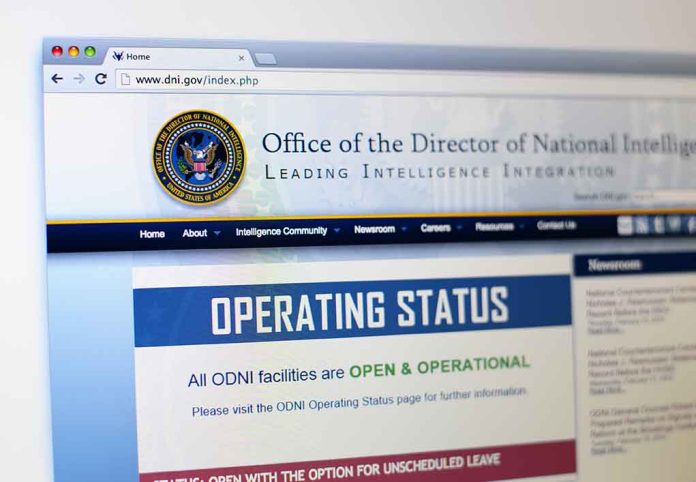
Tulsi Gabbard, former Democratic congresswoman and Iraq war veteran, has been confirmed as the new Director of National Intelligence in a contentious Senate vote, marking a significant shift in U.S. intelligence leadership.
Key Takeaways
- The Senate confirmed Tulsi Gabbard as Director of National Intelligence in a 52-48 vote, largely along party lines.
- Gabbard’s confirmation faced opposition due to her past meetings with Syrian President Bashar al-Assad and her stance on government surveillance.
- Her appointment reflects President Trump’s influence over the GOP and his efforts to reshape the federal government.
- Gabbard’s lack of formal intelligence experience and her promise to focus on core missions of the intelligence office swayed GOP senators.
- The confirmation has sparked debates about the future direction of U.S. national security and intelligence operations.
A Controversial Confirmation
In a move that has sent ripples through Washington’s political landscape, the Senate has confirmed Tulsi Gabbard as the new Director of National Intelligence. The vote, which fell largely along party lines with a 52-48 split, underscores the divisive nature of Gabbard’s nomination and the influence of President Trump over the Republican Party.
Gabbard, a former Democratic congresswoman from Hawaii and Iraq war veteran, has been a polarizing figure in American politics. Her confirmation process was marked by intense scrutiny of her past actions and statements, particularly her meeting with Syrian President Bashar al-Assad and her views on government surveillance.
BREAKING: Tulsi Gabbard confirmed as Director of National Intelligence. pic.twitter.com/vVP5hjsOY0
— Fox News (@FoxNews) February 12, 2025
Shifting Stances and Republican Support
During her confirmation hearings, Gabbard demonstrated a willingness to adapt her positions. She reversed her stance on pardoning Edward Snowden and softened her criticism of the Foreign Intelligence Surveillance Act’s Section 702. This flexibility, combined with her commitment to streamline the Office of the Director of National Intelligence, won over key Republican senators.
“The Office of the Director of National Intelligence … has become far larger than it was designed to be, and Ms. Gabbard shares my vision of returning the agency to its intended size” said Senator Susan Collins, explaining her support for Gabbard’s confirmation.
Senator Lisa Murkowski of Alaska echoed similar sentiments, stating, “While I continue to have concerns about certain positions she has previously taken, I appreciate her commitment to rein in the outsized scope of the agency.” This focus on administrative reform appears to have been a crucial factor in securing Republican support. Senator Tom Cotton who chairs the Senate Intelligence Committee was crucial in persuading uncertain senators to support Gabbard.
Democratic Opposition and Concerns
Democrats, however, remained largely unconvinced by Gabbard’s evolving positions. Senate Minority Leader Chuck Schumer voiced strong opposition, asserting that “Instead of speaking fact and truth, Ms. Gabbard repeatedly speaks the language of falsities and conspiracy theories.” This sentiment was shared by many in the Democratic caucus, who questioned Gabbard’s qualifications and past statements.
Senator Elissa Slotkin of Michigan went further, stating, “It is an insult to people who have dedicated their lives and put themselves in harm’s way to have her confirmed into this position.”
Implications for U.S. Intelligence
As Gabbard assumes her role as the overseer of 18 U.S. intelligence agencies, questions remain about how her leadership will shape U.S. intelligence operations and national security policy. Her appointment represents a significant departure from traditional intelligence leadership, reflecting the ongoing efforts to reshape the federal government at a time where Americans are highly skeptical of the intelligence agencies. Gabbard’s ability and openness to transform the intelligence agencies to align with President Trump’s vision will be a key component of determining her success. Her promise to focus on the core missions of the intelligence office and her outsider perspective could lead to significant changes in how intelligence is gathered, analyzed, and used to inform policy decisions.
“Ms. Gabbard, I submit that, if confirmed, the measure of your success will largely depend on whether you can return the ODNI to its original size, scope, and mission,” Cotton said.
As the intelligence community adapts to new leadership, the impact of Gabbard’s appointment on international relations, particularly with countries like Russia and Syria, will be closely watched. Her confirmation represents not just a change in personnel, but potentially a significant realignment in how the United States approaches intelligence gathering and national security in an increasingly complex global landscape.









